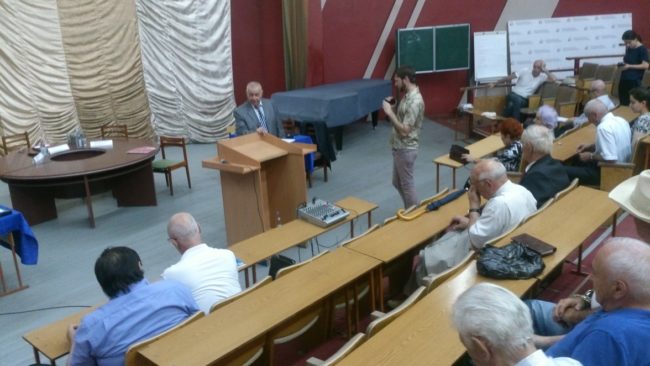
 A rights group in Kabardino-Balkaria is putting a former Soviet era official, who was executed for crimes he was later acquitted for back on trial. According to recent claims, Betal Kalmykov committed crimes against humanity as leader of Kabardino-Balkaria.
A rights group in Kabardino-Balkaria is putting a former Soviet era official, who was executed for crimes he was later acquitted for back on trial. According to recent claims, Betal Kalmykov committed crimes against humanity as leader of Kabardino-Balkaria.

The public tribunal, an unofficial trial being held by the local branch of the Russian Association of Victims of Political Repression, opened on 22 July in Kabardino-Balkaria’s Institute of Business.
Before the trial began, a number of people introducing themselves as police asked to install a surveillance camera in the hall, which was approved.
The charges levelled against Kalmykov include genocide, crimes against humanity, and abuse of official power in Kabardino-Balkaria in the 1920s and 1930s.
[Read on OC Media: No support and no understanding for victims of Stalin’s repressions in Kabardino-Balkaria]
Kalmykov, born in 1893 in Kabardino-Balkaria’s Terek Region, held various positions in the republic’s communist regime before being appointed First Secretary of the Communist Party in Kabardino-Balkaria in 1930. He was sentenced to death in 1940 as part of Stalin’s purges, but his name was rehabilitated and he was officially declared innocent in 1954.
‘This social process is still relevant, because today, just like in the 1920s and 1930s, the authorities of the Russian Federation and Kabardino-Balkaria have once again adopted the old Bolshevik practice of extrajudicial killings of political opponents, dissidents, and their relatives’, prosecutor Valery Khatazhukov said at the tribunal.
‘This whole process is not only about restoring historical and human justice, but this is an attempt to attract to the problem all the healthy forces of our society, an attempt to protect the rights of ordinary citizens of the republic’, he added.
Later, the prosecutor read aloud the text of the indictment, compiled on 60 pages, which accuses Kalmykov of being chairman of a special troika that handed down 3,000 repressive sentences.
Kalmykov was rehabilitated as a ‘victim of great terror’ during Khrushchev’s Thaw, and was exonerated based on the assumption that he was actually executed on false charges for being suspected of taking part in a Trotskyist conspiracy against Stalin, not for mass repressions against innocent residents of Kabardino-Balkaria, which were carried out on his orders.
A monument was then dedicated to Kalmykov in Nalchik attributing ‘all the successes Kabardino-Balkaria achieved’ to him.
The Russian Association of Victims of Political Repression has also advocated dismantling the monument and replacing it with a memorial to the people executed in of Kabardino-Balkaria during Kalmykov’s rule.
According to one of the judges, the next session will take place on 5 August.




 26 July 2017
26 July 2017


